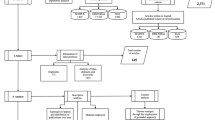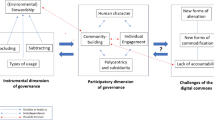Abstract
This paper explores the value to society of the archives of large international businesses or multinational companies. It highlights the importance of having access to the archives of multinational companies and the role these archives play in documenting the history of our society. This paper also looks at the motives for multinational companies to establish archival programmes and the attendant challenges they face. The archives of multinational companies differ from the archives of national businesses because they operate in various countries and are therefore subject to different international laws and regulations. Furthermore, recordkeeping and archiving practices differs from country to country. The focus of this paper is global and explores the subject from a societal perspective.
Similar content being viewed by others
Notes
Multinational companies are profit making companies with business operations and locations in more than one country, or incorporated or unincorporated businesses comprising parent enterprises with their foreign affiliates (source: World Investment Report 2005, UNCTAD, Geneva, Switzerland).
The Economist. London: December 3, 1994. vol 333, no. 7892; p. 78. For more information also see the: Union Carbide Bhopal Information Center at: http://www.bhopal.com/.
Brent Spar Dossier at: http://www-static.shell.com/static/gbr/downloads/e_and_p/brent_spar_dossier.pdf and Brent Spar’s Long Saga at: http://news.bbc.co.uk/2/hi/europe/221508.stm.
Examples are: Global Reporting Initiative G3 Guidelines, Social Accountability International, United Nations Conference on Trade and Development.
The South African Freedom of Information Act of 2000 includes a unique provision that allows individuals and government bodies to access records held by private bodies when the record is “necessary for the exercise or protection” of people's rights. More information available at: http://www.freedominfo.org/countries/south_africa.htm.
Although this is a security issue, it is most likely also a practical issue as generally business archives have a small staff and limited researcher facilities.
ENRON, a large American energy company went bankrupt in 2001 following accusations and fraud with its financial reporting. Parmalat, an Italian diary and food company nearly went bankrupt in 2003 following accusations of financial wrongdoing.
Examples are: University of Melbourne Archives, Glasgow University Archives and Business Records Centre, Harvard Business School, and Regional business archives in Germany such as Bayerisches Wirtschaftsarchiv, Stiftung Westfälisches Wirtschaftsarchiv and Hessisches Wirtschaftsarchiv.
Some examples of national or regional business archives associations: Business Archives Council of the UK (BAC), Business Archives Council of Scotland, Verein deutscher Wirtschaftsarchivare (VdW), SAA Business Archives Section and the Nederlandse Vereniging Bedrijs Archivarissen (NVBA).
The strategy can be consulted at: http://www.businessarchivescouncil.org.uk/materials/national_strategy_for_business_archives.pdf.
References
Adkins E (2004) Local history versus corporate history: responsible archival management of international subsidiaries of multinational corporations. Paper delivered at global business—local cultural heritage conference in Stavanger, Norway. Available at: http://www.arkivverket.no/stavanger/konferanse/corporate.html. Accessed 15 Oct 2008
Adkins E, Haglund-Tousey B (2007) Access to business archives: US access philosophies. Paper presented at the access to archives: The Japanese and American practices conference, Tokyo. Available at: http://archivists.org/publications/proceedings/accesstoarchives/10_B-TOUSEY_E-ADKINS.pdf. Accessed 15 Oct 2008
Bovens M (2002) Information rights: citizenship in the information society. J Polit Philos 10(3):317–341
Calland R (2007) Prizing open the profit-making world. In: Florini A (ed) The right to know transparency for an open world. Columbia University Press, New York
Ellis J (1999) Consulting into business archives. Arch Manuscr 27(2):16–25
Fode H, Fink J (1999) Business archives in Scandinavia. Arch Manuscr 27(2):54–67
Giddens A (1990) The consequences of modernity. Stanford University Press, Stanford
Graham M (2002) Democracy by disclosure: the rise of technopopulism. Brookings Institution Press, Washington
Gray V (2002) Developing the corporate memory: the potential of business archives. Bus Inf Rev 19(1):32–37
International Council on Archives, Section on Business and Labour Archives (2004) Business archives in international comparison. Available at: http://www.ica.org/sites/default/files/SBL25082004.pdf. Accessed 15 Oct 2008
Kirsch D (2009) The record of business and the future of business history: establishing a public interest in private business records. Libr Trends 57(3):352–370
Rabchuk G (1997) Life after the “Big Bang”: Business archives in an era of disorder. Am Arch 60:34–43
Richmond L (2002) The memory of society: business. Comma. Int J Arch 1–2:113–119
United Nations Conference on Trade and Development (UNCTAD) (2004) Disclosure of the impact of corporations on society: current trends and issues. New York and Geneva. Available at: http://www.unctad.org/en/docs/iteteb20037_en.pdf. Accessed 15 Oct 2008
Author information
Authors and Affiliations
Corresponding author
Rights and permissions
About this article
Cite this article
Deserno, I. The value of international business archives: the importance of the archives of multinational companies in shaping cultural identity. Arch Sci 9, 215–225 (2009). https://doi.org/10.1007/s10502-009-9106-1
Published:
Issue Date:
DOI: https://doi.org/10.1007/s10502-009-9106-1




